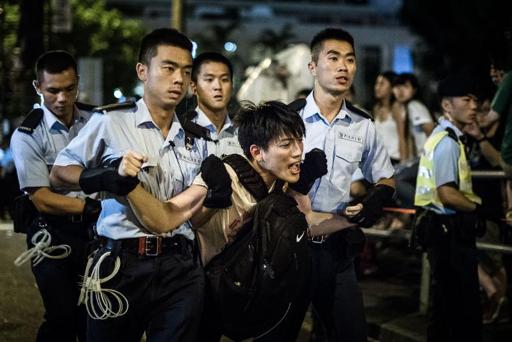Hong Kong police arrested more than 500 protesters at a sit-in early Wednesday following a huge march that organisers said mobilised half a million people demanding democratic reforms.
The arrests followed a largely peaceful march on Tuesday that protest leaders said brought the biggest crowds onto the streets since the city was handed over from Britain to China in 1997.
Police moved in at 3:00 am to break up the sit-in by about 2,000 protesters in the semi-autonomous city's Central financial district with some being dragged away by officers.
They said 511 demonstrators were arrested for illegal assembly or obstructing police, but pro-democracy activists and Amnesty International criticised the move as excessive.
Several pro-democracy lawmakers were among those arrested.
Police lifted activists, many lying on the ground with their arms chained to each other, onto coaches that took them to a temporary detention centre at a police college in Wong Chuk Hang district.
"I have no regrets!" one of them shouted, while others flashed V-for-victory signs.
A police spokeswoman said in a statement late Wednesday that 18 people had been released on bail while 364 people were released without charge. The rest remained detained pending further investigation.
"It was necessary for police to make arrests in order to quickly restore transportation and order in the Central core financial district," Hong Kong's security minister Lai Tung-kwok told reporters.
Lai said police carried out the arrests in a professional manner and with "maximum restraint".
Discontent in Hong Kong is at its highest level in years over Beijing's insistence that it vet candidates before a vote in 2017 for the city's next leader.
Pro-democracy group Occupy Central has said it will stage a mass sit-in in Central later this year unless authorities come up with acceptable electoral reforms.
Hong Kong enjoys liberties not seen on the mainland, including free speech and the right to protest, but there are heightened fears that those freedoms are being eroded.
Concerns increased in June when Beijing published a controversial "white paper" on Hong Kong's future that was widely seen as a warning to the city not to overstep its bounds.
After the document was published, nearly 800,000 people took part in an unofficial referendum calling for residents to have a say in the nomination of candidates for chief executive in the 2017 election.
Beijing branded the vote "illegal and invalid".
Tens of thousands of marchers Tuesday carried banners with slogans including "We want real democracy" and "We stand united against China".
'Trying to hijack political reform'
Beijing's state-run China Daily said Tuesday's march proved that Hong Kong's "citizens have continued to enjoy rights and freedoms since the handover".
But dissidents were "trying to hijack political reform with regards to the process for electing the chief executive" and had "resorted to unlawful activities" to pursue their goal, it said, in a reference to the referendum.
Pro-democracy activists condemned the arrests.
"There was no violence and there was no confrontation with the police, why should some 500 people be arrested?" former number two official in Hong Kong's government, Anson Chan said.
"Police now have made citizens feel that they are against them."
Amnesty International urged authorities to release detainees unconditionally.
"This was not an illegal assembly; it was a peaceful and legitimate protest under international law. The police action was hasty and unnecessary and sets a disturbing precedent," said Mabel Au, Amnesty's Hong Kong director.
China has promised to let all Hong Kong residents vote for their next leader in 2017, instead of the 1,200-strong pro-Beijing committee that currently chooses the chief executive.
But Beijing says candidates must be approved by a nominating committee, which democracy advocates fear will mean only pro-China figures are allowed to stand.
'Genuine choice of candidates'
The United States supported calls for Hong Kong's voters to be given a say in who can run in 2017.
"We believe that the legitimacy of this person (next leader) will be enhanced if universal suffrage is fulfilled and if the election provides a genuine choice of candidates that are representative of the voters' will," said State Department spokeswoman Marie Harf.
Hong Kong's pro-reform Apple Daily newspaper welcomed Tuesday's rally, which saw huge crowds pour onto clogged streets despite soaring humidity and rainstorms, as "a repeat of the '03 miracle".
In that year half a million people took to the streets against a national security bill that was later shelved.
Rally organiser Johnson Yeung said at least 510,000 protesters joined Tuesday's rally. Police said 98,600 people took part.
One of those marching, the chairman of the Hong Kong post office union, Ip Kam-fu, said he joined the rally to protect the next generation, accusing the city's government of kowtowing to Beijing.
"This march is not for us, it's for our children. Without universal suffrage there's no way to monitor the government," he said.





















































